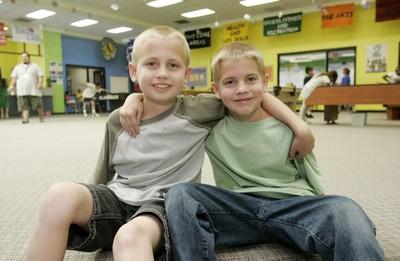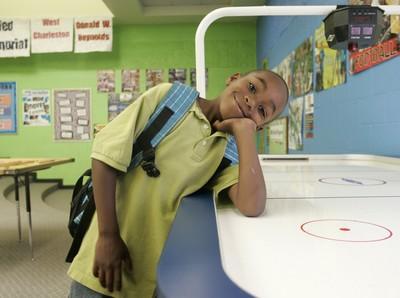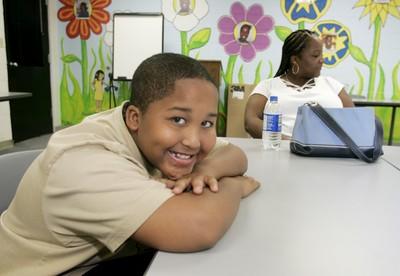ROLE MODELS




What is a brother or sister? Someone who always is there with a word of encouragement.
What do you think of your big brother? "A little bit annoying," says Perry Barton, 8.
And your little brother? "He is annoying," answers Blake Barton, 10.
A brother or sister is someone who can teach you stuff. Such as when D’Angelo Cook, 10, eats with his elbows on the table, and his older half-brothers correct his manners with a well-placed thwack with a spoon.
"They’d just look at me and go with the spoons — Pow!" D’Angelo says, underscoring the painful results by rubbing his elbows.
And, a brother or sister is — get ready for this one, moms and dads — a teacher who can have as much effect on who a child becomes as parents, teachers and other adults in his or her life.
Las Vegas psychologist Maria Doncaster says much of the research on siblings explores the effects of birth order in families and the pathologies that can occur among siblings. Less common but on the rise are studies on how otherwise healthy siblings influence one another regarding such issues as joining a gang, abusing alcohol or drugs, and smoking.
A sibling "can be your best friend or, like Cain and Abel, your worst enemy, depending on the dynamics in the family," Doncaster says.
The influence of a sibling can appear early in life. Charlene Domschot has four daughters ranging in age from 4 to 20, and notices that her youngest already models the behavior of her older sisters.
Emma is "like a miniature teenager," she says. "She prefers her older sisters’ music, likes to dress the way they do and looks forward to doing what they do."
Sometimes, Emma even "mimics their attitudes, the teenage attitudes, where you’re rolling your eyeballs and all that good stuff," Domschot says.
The older girls notice it, too. Jessica, 20, says Emma "wanted to wear a bra already at 4."
At age 2, "she wanted to wear deodorant," Jessica adds. "She couldn’t even say it, so she called it ‘odie.’ "
"She said the other day she can’t wait to get older so she could shave her legs," notes Megan, 15.
"I asked her how old she thinks she is," says Heather, 13. "She thinks she’s 14 and she acts like it."
On the upside, Domschot says jokingly, "it sounds crazy, but she hung out with them so much they basically potty-trained her, because she was always with them. That was a good thing."
"The hardest thing for them, probably, is when they have friends over and she wants to hang out with them. They put up with it, then decide, ‘Nope.’ "
Emma’s sisters do realize that they influence their little sister. "You have to make sure you act good around her so she doesn’t pick up bad stuff," Megan says.
Blake Barton notices that his younger brother, Perry, sometimes "copies me."
"He does whatever I do. Like, I wear something and he likes it, and he copies."
True? A smiling Perry nods.
Yet, the boys obviously are close. Their mother, Tami, describes Blake as the more laid-back of the pair, and Perry "the daredevil."
Perry tells how he recently hit his head by jumping off the bed, a la Superman. Asked whether he ever gives his younger brother advice, Blake says he does.
"Like, I told him not to jump from the bed," he answers.
Nyrel Bruno, 8, has a little sister who’s 3 and who sometimes does "try to copy what I do."
He takes it as a compliment, though, and says he enjoys teaching his sister things, from handstands to homework, "so when she grows up she can learn to do all those things."
Nyrel says there are times when the roles seem to be reversed. Mom, Jovaughn Bruno, says that when Nyrel and his friends are play-fighting at home, "she’ll run down the hallway, (saying), ‘Get off of my brother,’ pounding them."
Sometimes, Nyrel agrees, "she’s more like a big sister to me."
Tish Corner has no doubt that her son, D’Angelo Cook, is influenced by his two half-brothers, who are 12 and 14.
The three are close, and when they began hanging out with D’Angelo, "I noticed the testosterone levels rise," she says, laughing.
But Corner says it does D’Angelo good to "have someone else to look up to, and not just me or his dad."
D’Angelo admits he follows his half-brothers around and often does what they do and wears what they wear. They’re usually OK with that, D’Angelo adds.
"It depends, because sometimes if they notice how I’m wearing the cool things they’ll say, ‘Why are you doing that like me?’ I said, ‘Just because.’ And then sometimes (they get) annoyed."
A sibling’s influence doesn’t flow from just oldest to youngest. Children can influence one another, regardless of where they fall in birth order.
"We all have our own style," Megan Domschot says, "but we kind of pick up each other’s style a little bit."
Eldest Jessica sees a bit of herself in Megan, "because when I was a teenager I was a little mean," she says, as her sisters laugh. "She’s a little mean now, and I’m sure she’s gonna get that way."
"We all have different personalities," Heather agrees, "but there is probably part of each of us in every single one.
"If we’re in an argument and I say something Megan has said, she says: ‘That’s what I say. You can’t say that.’ "
If a family is its own microcosm of the world, dealing with siblings can be a way to learn family skills that someday can serve as life skills.
Siblings can, for instance, teach each other about the art of compromise and negotiation. Perry Barton says he and his big brother sometimes broker deals around the house.
"Like when we need to clean up something, we make a deal," he says. "Like, he makes my bed and I pick up the closet or some of the living room or the bathroom."
Siblings also can serve as sources of information for learning how to negotiate life. D’Angelo Cook says he often asks his half-brothers questions about everything from homework to popular culture trivia.
Siblings can serve as a medium for developing responsibility. Nyrel Bruno says he and his sister routinely look out for each other.
"It’s my job to take care of her because I’m her big brother," he explains.
A sibling’s influence can be so strong that children often create their own miniature subculture.
"When you’re driving down the road, the conversation they’ll have in the back seat, it’s just like two little adults talking back there," Tami Barton says. "They have their own little language and lingo back there."
It’s interesting, too, that a younger sibling might occasionally think about being an only child but, when pressed, admits that having a brother or sister is a good thing.
"I wouldn’t want to be an only child," Heather Domschot says. "There wouldn’t be anybody to talk to.
"You get to talk to them about things you wouldn’t talk to your parents about and ask for advice and stuff."
Can Perry Barton imagine not having an older brother? "Yes," he says. "But I’d be bored the rest of my life."
D’Angelo Cook agrees. "It’d be so lonely."
Sibling influence variesOf course, none of this sibling influence stuff is a slam-dunk certainty. For every young child who wants to be like an older brother or sister, there’s another who desires the exact opposite.
One factor may be the personality of the siblings themselves. Las Vegas psychologist Maria Doncaster says modeling behavior is more likely "if they were a good match and they would be friends even if they weren’t siblings."
And that’s for good or bad.
"If you regard your big brother or big sister like a friend and she started to do certain things she shouldn’t do, like drugs, then you’ll think (drugs are) OK, and vice versa," Doncaster says.
Birth order may play a part, too, notes Dr. David Gremse, chairman of the pediatrics department at the University of Nevada School of Medicine.
"The older child in a family often does take on more of a leadership role, and those kinds of traits are noticed and observed by the younger child," Gremse says. "So, oftentimes, they will try to emulate the behavior of the older brother and sister."
The unresolved tug of war between nature and nurture also may be a factor in the equation. Gremse asks: How much of who we are is imbedded in us, and "how much is shaped by family?"
Relationships among siblings certainly involve family dynamics. That, Gremse notes, is why a pediatrician will take note of how a young patient interacts with not only his parents, but his brothers and sisters.
Sometimes, sibling-sibling tensions can manifest themselves in the form of attention deficit, learning disorders or acting-out behavior, Gremse says. A child even may experience physical symptoms — bed wetting or stress-related conditions, for example — stemming from conflict with a sibling.












